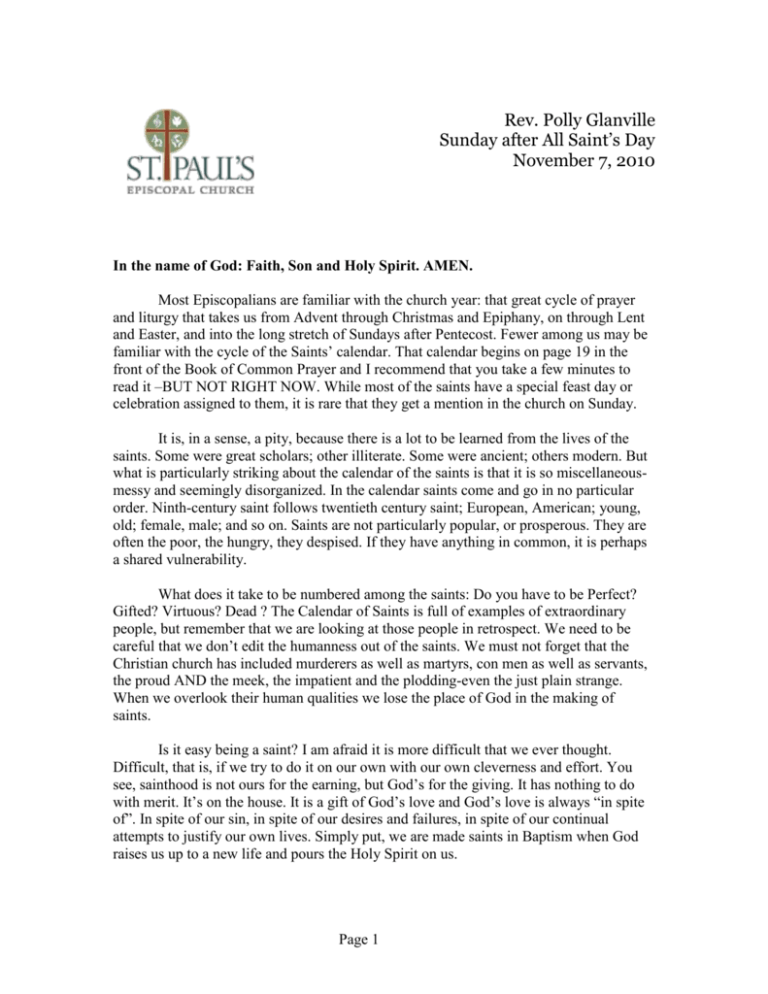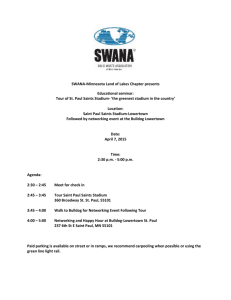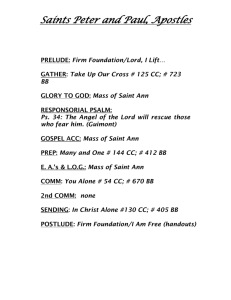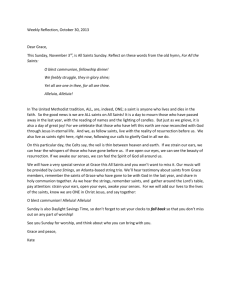Rev. Polly Glanville Sunday after All Saint's Day November 7, 2010
advertisement

Rev. Polly Glanville Sunday after All Saint’s Day November 7, 2010 In the name of God: Faith, Son and Holy Spirit. AMEN. Most Episcopalians are familiar with the church year: that great cycle of prayer and liturgy that takes us from Advent through Christmas and Epiphany, on through Lent and Easter, and into the long stretch of Sundays after Pentecost. Fewer among us may be familiar with the cycle of the Saints’ calendar. That calendar begins on page 19 in the front of the Book of Common Prayer and I recommend that you take a few minutes to read it –BUT NOT RIGHT NOW. While most of the saints have a special feast day or celebration assigned to them, it is rare that they get a mention in the church on Sunday. It is, in a sense, a pity, because there is a lot to be learned from the lives of the saints. Some were great scholars; other illiterate. Some were ancient; others modern. But what is particularly striking about the calendar of the saints is that it is so miscellaneousmessy and seemingly disorganized. In the calendar saints come and go in no particular order. Ninth-century saint follows twentieth century saint; European, American; young, old; female, male; and so on. Saints are not particularly popular, or prosperous. They are often the poor, the hungry, they despised. If they have anything in common, it is perhaps a shared vulnerability. What does it take to be numbered among the saints: Do you have to be Perfect? Gifted? Virtuous? Dead ? The Calendar of Saints is full of examples of extraordinary people, but remember that we are looking at those people in retrospect. We need to be careful that we don’t edit the humanness out of the saints. We must not forget that the Christian church has included murderers as well as martyrs, con men as well as servants, the proud AND the meek, the impatient and the plodding-even the just plain strange. When we overlook their human qualities we lose the place of God in the making of saints. Is it easy being a saint? I am afraid it is more difficult that we ever thought. Difficult, that is, if we try to do it on our own with our own cleverness and effort. You see, sainthood is not ours for the earning, but God’s for the giving. It has nothing to do with merit. It’s on the house. It is a gift of God’s love and God’s love is always “in spite of”. In spite of our sin, in spite of our desires and failures, in spite of our continual attempts to justify our own lives. Simply put, we are made saints in Baptism when God raises us up to a new life and pours the Holy Spirit on us. Page 1 A dramatic expression of this in-spite-of-nests occurred in the case of Martin Luther who was at one time an Augustinian monk. By taking monastic vows Luther thought he could live a righteous life, confessing his sins, receiving the sacraments and therefore becoming acceptable to God. He found it didn’t work. He could never trust that he had confessed every last one of his sins, so his relationship with God was always in doubt. The more he fixated on the concept, the worse it became. At some point Luther discovered God’s mercy. He realized that being accepted by God was gift of grace, given apart from good works or righteousness. Faith was the believer’s acceptance of God’s grace. Luther would go on to say that, if we lack that faith in God’s acceptance we are caught in a spiral of attempts to make ourselves righteous. Because God has made us righteous, we are totally saints; because of the actual nature of our lives, we are hopeless sinners. Christians are always “saint and sinner” at the same time-saints because they are holy in God’s eyes for Christ’s sake, and they do good works because that pleases God; simmers because they continue to sin until death. The Apostles’ Creed states that “the holy Catholic Church " is “the communion of saints,” meaning that the members of the Church are a company of holy or “set apart” people. Then the Creed confesses “the forgiveness of sins.” Saints are forgiven sinners. A saint is a person who believes that in Jesus Christ sin has been forgiven. Yesterday at the 5:30 service, a little boy was baptized in the chapel and joined our community of saints. Touched by God’s grace, filled with the Spirit that child, like us, is justified before God and empowered to live a life of faithfulness and service not because of good works but because of the love of God for sinners. And like us, he can become a sign of God’s love for the world, a sign that love and repentance, mercy and courage count. Most of us probably do not think of ourselves as saints and certainly not as holy ones. That would seem to lump us in with those pious, righteous figures up on the walls or in the stained glass of some churches. They never seem to show much joy and they appear so removed from our world. The truth of the matter is more probably that those we perceive that way were more lonely than pious, more shy than righteous. In any case, the New Testament classifies us all as saints, the pious and the not so pious. Page 2 At the Parish Retreat last weekend some of us joined Dan Fortune for an old fashioned hymn sing. We had great fun taking turns and calling out the numbers of favorite hymns which we would sing with greater or lesser skill but with plenty of enthusiasm. One of the songs we sang was Hymn number 293 and it contains these words that describe the saints: “One was a doctor, and one was a queen and one was a shepherdess on the green: They were all of them saints of God, and I mean God helping, to be one too. One was a soldier and one was a priest, and one was slain by a fierce wild beast: And there’s not any reason, no not the least, why I shouldn’t be one too.” The history of the Christian faith is a history of people who love mercy, justice and peace so much that they have been willing to die for them. It has been the history of people who have given shelter to the poor, worked to free slaves, and treated women as equal to men. And then there are those nameless saints who don’t appear in any book. Those who routinely feed the hungry or visit the sick; those who fight to address injustice in our social and political systems. They are the people who work to provide goods and services in a way that respects the Earth as God’s creation. They are the people who take time to mentor a child or to comfort the bereaved. They are the nameless people who work for what is right and good and fair for all people. The saints of God touch our lives everyday. Saints are people who live in the love of God. It doesn’t matter if they are a monk in Italy, and elderly nun in India- or the people from St. Paul’s who take flowers to a hospital room or knit prayer shawls. Or the woman who works to provide housing for a homeless family or the people who work in the community garden to grow food for the hungry. Or the man who has spent seventy years of his life in the choir of this church. All of them are ordinary people who do extraordinary things by the grace of God. The saints of God are among us. The saints of God ARE us. Saints come in every color, size and shape. Louis of France, who wore a crown for Christ, stands next to Benedict Joseph Labre, who wore rages for Christ. Agnes, martyr at Rome 1,700 years ago stands next to Elizabeth Seton, a 19th American. They stand with a Mexican farm worker, a Russian grandmother, a Lutheran from HelsinkI: all of them looking themselves and all of them with a bit of Jesus in them. Page 3 The Feast of All Saints celebrates the fact that we have great examples in the continuing stories of the saints who have gone on before. We acknowledge and honor the memory and impact of those heroes and heroines of the faith who continue to live, not only with God, but in our collective memories. We can hold fast to the reality that the path to Heaven has been established and traveled by countless people-known and unknown- to God’s kingdom. We can be sure that we are, in the words from Hebrews, “surrounded by so great a cloud of witnesses.” Like the saints of old, we live out our sainthood in daily life. Home and school, community and nation, work and play, citizenship and friendship; we belong to God. God calls us to God’s work in all times and all places. We have before us the examples of prophets and apostles, servants and martyrs, ordinary men and women who took their baptism seriously and let God’s grace change their lives. The celebration of All Saints’ is a celebration of our faith that we are counted in that number. AMEN. Page 4







